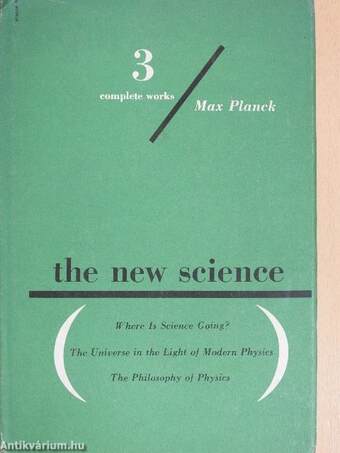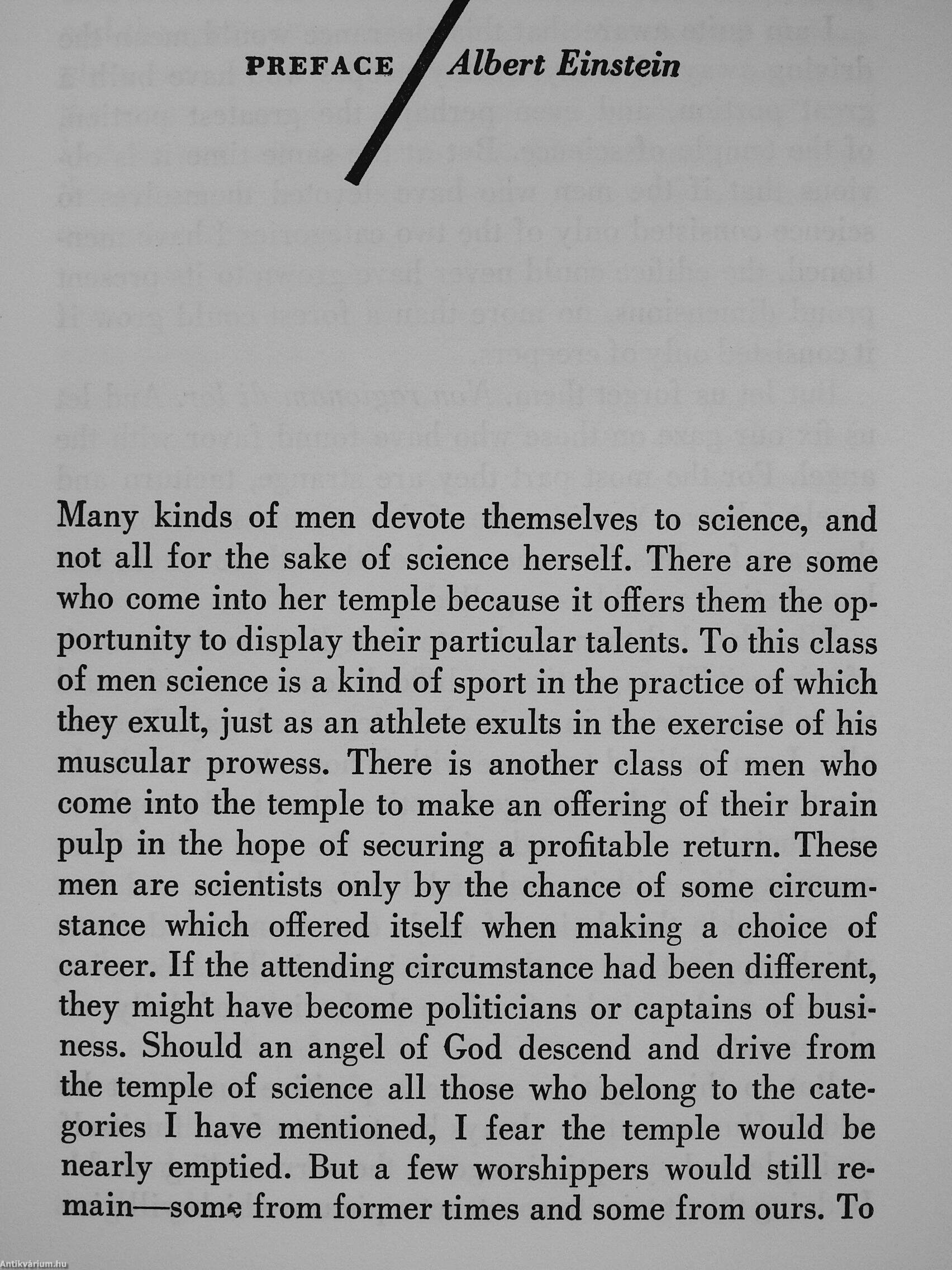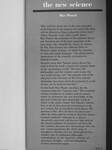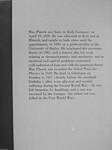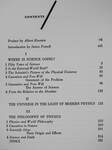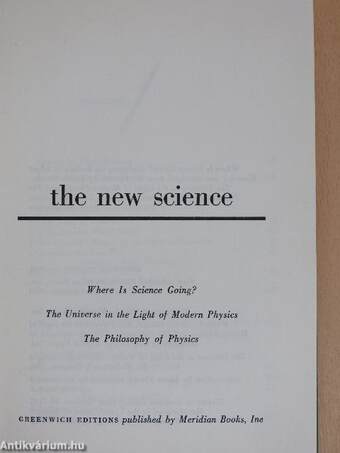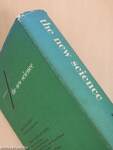1.067.327
kiadvánnyal nyújtjuk Magyarország legnagyobb antikvár könyv-kínálatát

VISSZA
A TETEJÉRE
JAVASLATOKÉszre-
vételek
The New Science
3 complete works/Where Is Science Going?/The Universe in the Light of Modern Physics/The Philosophy of Physics
| Kiadó: | Greenwich Editions-Meridian Books, Inc |
|---|---|
| Kiadás helye: | |
| Kiadás éve: | |
| Kötés típusa: | Vászon |
| Oldalszám: | 328 oldal |
| Sorozatcím: | |
| Kötetszám: | |
| Nyelv: | Angol |
| Méret: | 21 cm x 14 cm |
| ISBN: | |
naponta értesítjük a beérkező friss
kiadványokról
naponta értesítjük a beérkező friss
kiadványokról
Előszó
TovábbFülszöveg
"His work has given one of the most powerful of all impulses to the progress of science. His ideas >! will be effective as long as physical science lasts." Albert Einstein wrote these words about Max Planck, the originator of the quantum theory and therefore one of the most important of the innovators who changed the course of science. In The New Science are collected three of Planck's major writings, in which he examines — in clear and simple language — the philosophical implications of the scientific revolution he helped to create.
Einstein wrote that "human nature always has tried to form for itself a simple and synoptic image of the surrounding world." The poet, the philosopher, and the scientist each creates his own world picture, and "the supreme task of the physicist is the discovery of the most general elementary laws from which the [scientist's] world picture can be deduced logically." In this book Max Planck elucidates for the common reader this "supreme task." The... Tovább
Fülszöveg
"His work has given one of the most powerful of all impulses to the progress of science. His ideas >! will be effective as long as physical science lasts." Albert Einstein wrote these words about Max Planck, the originator of the quantum theory and therefore one of the most important of the innovators who changed the course of science. In The New Science are collected three of Planck's major writings, in which he examines — in clear and simple language — the philosophical implications of the scientific revolution he helped to create.
Einstein wrote that "human nature always has tried to form for itself a simple and synoptic image of the surrounding world." The poet, the philosopher, and the scientist each creates his own world picture, and "the supreme task of the physicist is the discovery of the most general elementary laws from which the [scientist's] world picture can be deduced logically." In this book Max Planck elucidates for the common reader this "supreme task." The twentieth-century revolutions in politics and art cannot match in excitement our new knowledge of the physical world, the most spectacular result of which is the atomic bomb. But Planck's interest here is not in the practical consequences of the new science, but in something much deeper. His question is this: How do these new discoveries affect the philosophical problems that have always haunted mankind? Although he is almost obsessively concerned with the new light shed on the eternal problems of causation and free will, this eminent physicist also demonstrates how the new science transforms the whole range of metaphysics. Readers of every philosophical bias — whether that of traditional philosophy, existentialism, or the linguistic criticism of speculative thought — will find stimulation in these provocative pages.
GE 8
Max Planck was born in Kiel, Germany, on April 23, 1858. He was educated in Kiel and in Munich, and taught in both cities until his appointment, in 1889, to a professorship at the University of Berlin. He originated the quantum theory in 1901, and is known also for work relating to thermodynamics and mechanics and to electrical and optical problems associated with radiation of heat and with the quantum theory. Max Planck was awarded the Nobel Prize for Physics in 1918. He died in Gbttingen on October 4, 1947 (shortly before his ninetieth birthday), after acute physical and mental suffering during the Second World War — he was left homeless by bombings and a son was executed by the Gestapo ( his oldest son was killed in the First World War). Vissza
Témakörök
- Filozófia > A szerző származása szerint > Német
- Idegennyelv > Idegennyelvű könyvek > Angol > Természettudományok > Csillagászat
- Idegennyelv > Idegennyelvű könyvek > Angol > Természettudományok > Fizika
- Idegennyelv > Idegennyelvű könyvek > Angol > Természettudományok > Egyéb
- Idegennyelv > Idegennyelvű könyvek > Angol > Művelődéstörténet
- Idegennyelv > Idegennyelvű könyvek > Angol > Filozófia > Nemzetisége szerint > Német
- Művelődéstörténet > Eszmetörténet > Tudományok
- Természettudomány > Fizika > Idegennyelvű
- Természettudomány > Fizika > Társtudományok > Egyéb
- Természettudomány > Fizika > Története
- Természettudomány > Csillagászat > Egyéb
- Természettudomány > Csillagászat > Idegennyelvű
- Természettudomány > Csillagászat > Világegyetem
- Természettudomány > Általános természettudomány > Kutatások, felfedezések
- Természettudomány > Általános természettudomány > Tanulmányok
- Természettudomány > Általános természettudomány > Történet
- Természettudomány > Általános természettudomány > Idegennyelvű > Angol
- Filozófia > Témaköre szerint > Tanulmányok, esszék
- Filozófia > Témaköre szerint > Szakfilozófiák
- Idegennyelv > Idegennyelvű könyvek > Angol > Filozófia > Témaköre szerint > Tanulmányok, esszék
- Idegennyelv > Idegennyelvű könyvek > Angol > Filozófia > Témaköre szerint > Szakfilozófiák



